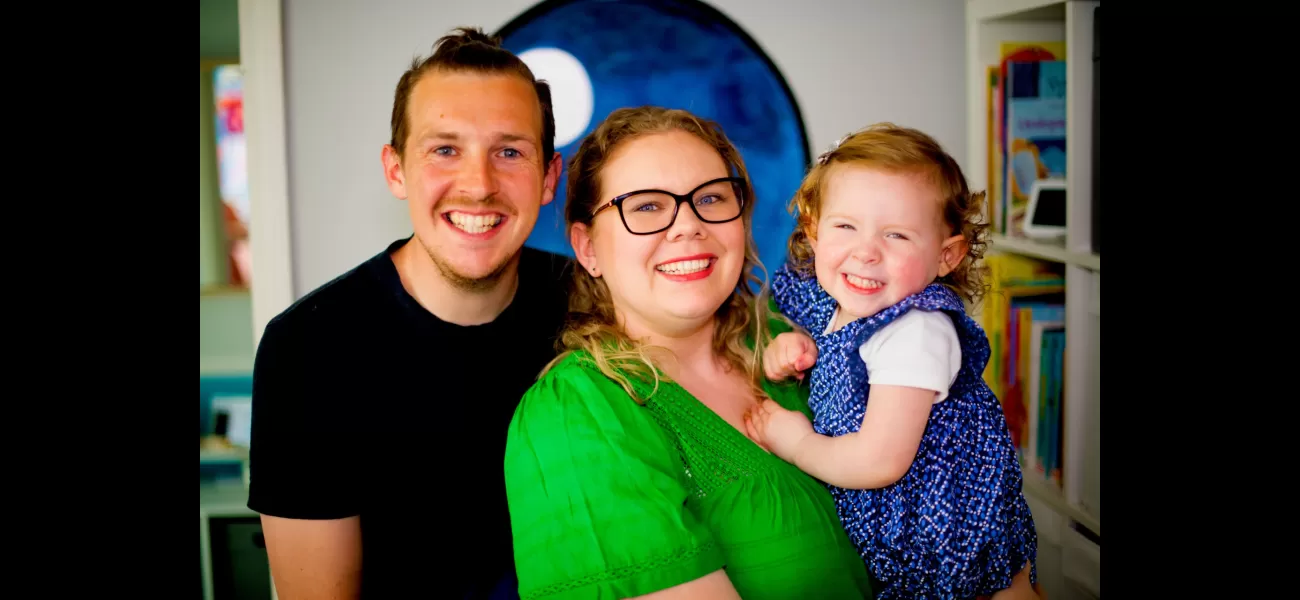No amount of leave can ever be enough for modern dads; they need more time with their families.
8/10 dads reported their employer lacked support for them in the workplace.
June 17th 2023.

Billy Beech was at work when his phone buzzed. Opening the message, it was a video his wife had sent him of their baby daughter’s first-ever babble of words. His heart sank. Another milestone missed because he was at work.
“It was heartbreaking,” Billy says. “Something like that just makes you long to be at home to be in those moments, not just seeing them on the screen.”
Billy was a groundsman at a Premiere League Football stadium, working seven days a week and often 16-hour days. When his daughter Penny was born in February 2019, he got two weeks off for paternity leave, but then he was back at work, leaving his wife to figure out how to parent alone.
“It felt like snapping back to the real world,” he remembers. “It was a shock to the system to be apart suddenly. This amazing new chapter we started together was continuing on without me on weekdays.”
The issues of high childcare costs and inflexible working conditions have received wide coverage and action in recent years, however, it’s still thought of as a ‘women’s issue’. Jeremy Davies, who runs the Fatherhood Institute think tank, explains that “it’s very much framed as the mother’s problem. It would be helpful for people to be really careful when childcare issues are discussed and debated – and for it not to be talked about a women’s issue.”
Billy was missing out on his infant daughter’s milestones and feeling the conflict between supporting his family financially and being there for them. So, in 2021, he decided to leave his career and join his wife, who had recently started a childminding business out of their home.
“It’s difficult with postnatal depression and the exhaustion of being with that child,” he says. “The way we’ve been raised is that we have to work and sacrifice to give our families what they deserve, but then we give all our time to someone else so we can earn enough to give them that life we think they deserve.”
Indeed, research from the campaigning group Pregnant Then Screwed found that 8 in 10 dads say their employer wasn’t not doing enough to support fathers in the workplace. Joeli Brearley, CEO of Pregnant Then Screwed, explains that when fathers and partners take paternity leave it supports the mother’s return to the labour market.
Founder of tiney Brett Wigdortz has seen a rise in the number of men training to be childminders out of their homes. “The pandemic and the new ways of working it ushered in has caused many parents to re-evaluate their careers and prompted them to seek out jobs that truly do fit around family life,” he explains. “It’s no surprise that many of them landed on childminding: it’s an opportunity to run your own business whilst spending time with your own children. Even more so than a regular home working role, childminding means that fathers are making a living by directly engaging with their little ones. They no longer have to worry about missing out.”
The first connections a father forms with his child are some of the most precious, however, at present, 80% of fathers are only offered two weeks off for paternity leave in the UK. According to data from Pregnant Then Screwed, one in four dads don’t even manage to take the full two weeks, saying they couldn’t afford to take it, as Paternity Pay is set at just £172.48 per week.
Jeremy Davies of Fatherhood Institute says “the evidence suggests that what happens in the first year of life is really important for the rest of childhood. Year one is when patterns of behaviour become fixed and can be difficult to shift. It is why parental leave is so important. Men and women are set off on different courses from the start.”
Billy’s story is one of many that demonstrates the importance of having paternity leave available. He is now able to form a strong connection with his daughter, Penny, who is now four.
“Penny just became a person,” Billy says. “In the early stages, they are babies. Then toddlers. Then all the sudden, they’re this little person. I would have missed that.”
Indeed, it’s clear that when fathers have increased amounts of time off in those early weeks and months of childhood, the ongoing load of parenthood has potential to be carried with increased levels of equity. If dads had more paternity leave, the father-child relationship could be strengthened and fathers wouldn’t have to miss out on those special moments.
Billy Beech was at work when his phone buzzed. Opening the message, it was a video of his wife had sent him of their baby daughter’s first-ever babble of words. His heart sank. His daughter was growing and he was missing out on all the milestones because he was at work.
“Something like that just makes you long to be at home to be in those moments, not just seeing them on the screen,” recalls Billy. He was working long hours in a Premier League Football stadium and it was a demanding job, with days often starting at 6am and not finishing until 9pm at night.
The issues of high childcare costs and inflexible working conditions have been widely discussed in recent years, but it’s still framed as a ‘women’s issue’. Jeremy Davies, who runs the Fatherhood Institute think tank, says “It would be helpful for people to be really careful when childcare issues are discussed and debated – and for it not to be talked about a women’s issue. Mothers have been dealing with unsupportive workplaces for decades and maternity discrimination remains a major issue. The challenge now for employers is to move away from sexist assumptions that affects both fathers and mothers and start to level the playing field.”
When Billy and his wife Sam had their first daughter Penny in February 2019, the couple decided that Sam would stay at home to avoid paying the high price of childcare. With his two weeks of paternity leave, Billy made the most of the time he had with his daughter. But when his time was up, he went back to work, leaving his wife to figure out how to parent alone.
“It was hard on her. I was away weeks on end,” he remembers. “It felt like snapping back to the real world. This amazing new chapter we started together was continuing on without me on weekdays.”
Billy felt he was missing out on his infant daughter’s milestones and the connection with his family. He wanted to support them financially, but felt it was coming at the expense of connection with them.
At the start of 2021, he decided to leave his career and join his wife, who had recently started a childminding business out of their home. This allowed him to spend more time with his daughter and be more involved in her life.
Along with Billy, the childcare initiative tiney has seen a rise in the number of men training to be childminders out of their homes. Brett Wigdortz, founder of tiney, explains “The pandemic and the new ways of working it ushered in has caused many parents to re-evaluate their careers and prompted them to seek out jobs that truly do fit around family life. It’s no surprise that many of them landed on childminding: it’s an opportunity to run your own business whilst spending time with your own children.”
The first connections a father forms with his child are some of the most precious, however at present, 80% of fathers are only offered two weeks off for paternity leave in the UK. According to data from Pregnant Then Screwed, one in four dads don’t even manage to take the full two weeks, saying they couldn’t afford to take it, as Paternity Pay is set at just £172.48 per week.
Joeli Brearley, CEO of Pregnant Then Screwed says when fathers and partners take paternity leave it supports the mother’s return to the labour market, allowing them to co-parent more effectively and for fathers to build stronger relationships with their children.
Billy is now able to be fully involved in his daughter’s life and all the milestones that come with it. He hopes that more dads can have the opportunity to do the same, and that employers take into consideration the importance of fathers when it comes to childcare.
“It was heartbreaking,” Billy says. “Something like that just makes you long to be at home to be in those moments, not just seeing them on the screen.”
Billy was a groundsman at a Premiere League Football stadium, working seven days a week and often 16-hour days. When his daughter Penny was born in February 2019, he got two weeks off for paternity leave, but then he was back at work, leaving his wife to figure out how to parent alone.
“It felt like snapping back to the real world,” he remembers. “It was a shock to the system to be apart suddenly. This amazing new chapter we started together was continuing on without me on weekdays.”
The issues of high childcare costs and inflexible working conditions have received wide coverage and action in recent years, however, it’s still thought of as a ‘women’s issue’. Jeremy Davies, who runs the Fatherhood Institute think tank, explains that “it’s very much framed as the mother’s problem. It would be helpful for people to be really careful when childcare issues are discussed and debated – and for it not to be talked about a women’s issue.”
Billy was missing out on his infant daughter’s milestones and feeling the conflict between supporting his family financially and being there for them. So, in 2021, he decided to leave his career and join his wife, who had recently started a childminding business out of their home.
“It’s difficult with postnatal depression and the exhaustion of being with that child,” he says. “The way we’ve been raised is that we have to work and sacrifice to give our families what they deserve, but then we give all our time to someone else so we can earn enough to give them that life we think they deserve.”
Indeed, research from the campaigning group Pregnant Then Screwed found that 8 in 10 dads say their employer wasn’t not doing enough to support fathers in the workplace. Joeli Brearley, CEO of Pregnant Then Screwed, explains that when fathers and partners take paternity leave it supports the mother’s return to the labour market.
Founder of tiney Brett Wigdortz has seen a rise in the number of men training to be childminders out of their homes. “The pandemic and the new ways of working it ushered in has caused many parents to re-evaluate their careers and prompted them to seek out jobs that truly do fit around family life,” he explains. “It’s no surprise that many of them landed on childminding: it’s an opportunity to run your own business whilst spending time with your own children. Even more so than a regular home working role, childminding means that fathers are making a living by directly engaging with their little ones. They no longer have to worry about missing out.”
The first connections a father forms with his child are some of the most precious, however, at present, 80% of fathers are only offered two weeks off for paternity leave in the UK. According to data from Pregnant Then Screwed, one in four dads don’t even manage to take the full two weeks, saying they couldn’t afford to take it, as Paternity Pay is set at just £172.48 per week.
Jeremy Davies of Fatherhood Institute says “the evidence suggests that what happens in the first year of life is really important for the rest of childhood. Year one is when patterns of behaviour become fixed and can be difficult to shift. It is why parental leave is so important. Men and women are set off on different courses from the start.”
Billy’s story is one of many that demonstrates the importance of having paternity leave available. He is now able to form a strong connection with his daughter, Penny, who is now four.
“Penny just became a person,” Billy says. “In the early stages, they are babies. Then toddlers. Then all the sudden, they’re this little person. I would have missed that.”
Indeed, it’s clear that when fathers have increased amounts of time off in those early weeks and months of childhood, the ongoing load of parenthood has potential to be carried with increased levels of equity. If dads had more paternity leave, the father-child relationship could be strengthened and fathers wouldn’t have to miss out on those special moments.
Billy Beech was at work when his phone buzzed. Opening the message, it was a video of his wife had sent him of their baby daughter’s first-ever babble of words. His heart sank. His daughter was growing and he was missing out on all the milestones because he was at work.
“Something like that just makes you long to be at home to be in those moments, not just seeing them on the screen,” recalls Billy. He was working long hours in a Premier League Football stadium and it was a demanding job, with days often starting at 6am and not finishing until 9pm at night.
The issues of high childcare costs and inflexible working conditions have been widely discussed in recent years, but it’s still framed as a ‘women’s issue’. Jeremy Davies, who runs the Fatherhood Institute think tank, says “It would be helpful for people to be really careful when childcare issues are discussed and debated – and for it not to be talked about a women’s issue. Mothers have been dealing with unsupportive workplaces for decades and maternity discrimination remains a major issue. The challenge now for employers is to move away from sexist assumptions that affects both fathers and mothers and start to level the playing field.”
When Billy and his wife Sam had their first daughter Penny in February 2019, the couple decided that Sam would stay at home to avoid paying the high price of childcare. With his two weeks of paternity leave, Billy made the most of the time he had with his daughter. But when his time was up, he went back to work, leaving his wife to figure out how to parent alone.
“It was hard on her. I was away weeks on end,” he remembers. “It felt like snapping back to the real world. This amazing new chapter we started together was continuing on without me on weekdays.”
Billy felt he was missing out on his infant daughter’s milestones and the connection with his family. He wanted to support them financially, but felt it was coming at the expense of connection with them.
At the start of 2021, he decided to leave his career and join his wife, who had recently started a childminding business out of their home. This allowed him to spend more time with his daughter and be more involved in her life.
Along with Billy, the childcare initiative tiney has seen a rise in the number of men training to be childminders out of their homes. Brett Wigdortz, founder of tiney, explains “The pandemic and the new ways of working it ushered in has caused many parents to re-evaluate their careers and prompted them to seek out jobs that truly do fit around family life. It’s no surprise that many of them landed on childminding: it’s an opportunity to run your own business whilst spending time with your own children.”
The first connections a father forms with his child are some of the most precious, however at present, 80% of fathers are only offered two weeks off for paternity leave in the UK. According to data from Pregnant Then Screwed, one in four dads don’t even manage to take the full two weeks, saying they couldn’t afford to take it, as Paternity Pay is set at just £172.48 per week.
Joeli Brearley, CEO of Pregnant Then Screwed says when fathers and partners take paternity leave it supports the mother’s return to the labour market, allowing them to co-parent more effectively and for fathers to build stronger relationships with their children.
Billy is now able to be fully involved in his daughter’s life and all the milestones that come with it. He hopes that more dads can have the opportunity to do the same, and that employers take into consideration the importance of fathers when it comes to childcare.
[This article has been trending online recently and has been generated with AI. Your feed is customized.]
[Generative AI is experimental.]
0
0
Submit Comment





